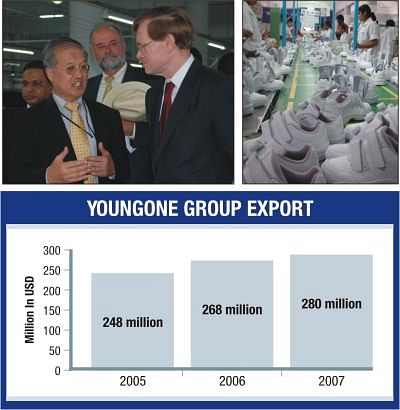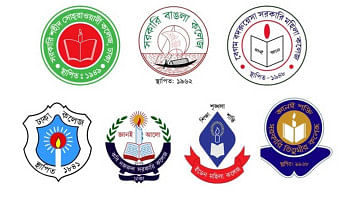Foreign investment comes with a clear future

(Left) Chairman of Youngone Corporation Kihak Sung talks to World Bank President Robert Zoellick at a plant of Youngone Corporation during Zoellick's visit to Bangladesh in November last year. (Right) A shoe manufacturing plant of the Korean company.
The improved performance of Chittagong port saved exports last year, but only a clear political future will encourage increased foreign investment, stresses Kihak Sung, one of the country's largest foreign investors.
It's a view that should be treated with respect. For three decades Sung, a South Korean, has been building businesses in Bangladesh mainly through his Youngone Corporation where he is the chairman and chief operating officer.
With operations ranging through the garment and footwear industry, the Youngone group last year had exports of over a quarter of a billion dollars. Youngone alone claims one fourth of the investments in the country's five export processing zones (EPZs) employing more than 35,000 people.
Speaking at his Dhaka residence Sung, now 61, was full of praise for the turn around at Chittagong, where he said the time taken to import raw materials had been slashed by 10 days.
"As a result, we could give the buyers a real delivery time and they are happy. We can now plan production more precisely. The situation in the port in the past was very bad," he said.
However while this success has brought a much-needed predictability to delivery times, unrest and destruction in the industrial zones have shaken investors' confidence. As a result, the foreign direct investment (FDI) flow to Bangladesh has declined.
"FDI has moved to Vietnam and other countries. Vietnam had record high FDI of 16 billion US dollars in the last year," he pointed out.
"I can't say exactly if the local politics affected the FDI trend in Bangladesh. May be some individual sectors have been affected," Sung said.
"For export growth, the country needs a peaceful environment in every aspect. Normally we do not expect any disturbances. But between May and July 2006, we lost many orders and buyers' confidence due to unrest and violent activities in the economic zone,"
"If investors cannot see their future clearlythey will not invest in a country. This is why investors typically do not make new investments prior to a national election. It's not an investor friendly time."
He said that the best way to gain investors' confidence is through following a consistent policy by successive governments. "This will improve the investment climate," he said, adding that this climate was lost before the January 11, 2007 caretaker government took over power.
Sung started his business venture in Bangladesh as a Korean joint venture partner in 1978 in the manufacturing sector. In 1981, he founded his Youngone, an apparel company, with 250 workers. This included women, the first time they had been used in the garment industry in Bangladesh.
By the 1990s Sung's business had expanded beyond Bangladesh and he now has stakes in operations in Vietnam, China, India, Korea and El Salvador. The total turnover of all his businesses is around $850 million annually.
Sung spends five to six days a month in Bangladesh, which he regards as his second home and about a week in his Korean residence each month. The rest of the time he moves between his ventures in different countriesmostly on his private jet.
Being an aviation enthusiast, Kihak Sung is planning to open an aviation school in Bangladesh.
Sung is well aware of the criticism by some labour leaders that the industries inside the EPZ's do not pay enough or allow the workers to exercise their rights. But he firmly refuted such allegations.
"As an investor we must follow the law of the country. We are in favour of Workers' Association. However it must be done as per the prescribed law. A smooth transition to Workers' Associations is very important for the country, its economy, Bangladesh Export Processing Zones Authority, workers and investors," he said.
"The EPZs generally pay workers 50 percent more than factories outside. The working environment quality is good and comparable with that in China or Vietnam. Plus the workers get various additional facilities and benefits," Kihak Sung pointed out.
Referring to the workers' unrest, he said it was up to the government to find out who was instigating it. "We have seen that there had been lots of false rumours in the industrial areas which triggered the unrest. Pre-arranged incidents triggered agitation among the workers.”
He notes that workers deprivation is normally a general allegation. "It should be specified why they attack a factory," he added.
On the question of whether Bangladesh's exports will suffer due to withdrawal of some restrictions on China's exports to USA and European Union, he said that this would affect Bangladesh. "But if Bangladesh diversifies exports and makes itself more efficient, it will not be a problem."
Youngone's biggest venture in Bangladesh is its own EPZ in Chittagongthe 2500-acre Korean Export Processing Zone (KEPZ), which was given a license last year after seven years of delay.
Sung said that within a few months, he would begin setting up a shoe manufacturing factorywhich he described as the world's biggestwith an annual production capacity of 30 million pairs.
The KEPZ plans to attract more than a billion dollars of investment and set up 500 industrial units. A weak point however is its power and energy supply.
The government is unable to provide adequate gas or power now or promise of good supplies in the immediate future.
"We are discussing a power project investment with the government. We have some interesting proposals. But all of it depends on gas supplies," he said.

 For all latest news, follow The Daily Star's Google News channel.
For all latest news, follow The Daily Star's Google News channel. 



Comments